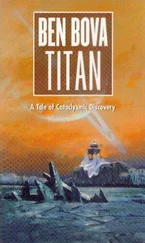He felt perspiration trickling along his ribs and saw Doreen absently try to wipe her brow, only to bump her gloved hand against the spongy bubble of her inflated helmet.
“You should’ve worn a head band,” he told her. “Keeps the sweat out of your eyes.”
Blinking hard, she said, “I didn’t think I’d be sweating when it’s so cold.”
“The suits keep your body heat in.”
“Now you tell me.”
The sifter rattled away. Carleton stopped it to study the contents of the tray beneath it, running his gloved fingers through the dust, finding nothing more than grains of rusty sand. Then he and Doreen poured still another load of shattered rock and started the machine rattling again. Even in the gentle gravity of Mars his arms were starting to ache.
“So much of science is manual labor,” he said as they strained to lift another carton of rubble onto the sifter’s grid. “Just plain donkey work. Hours of it. Years of it. All for the chance of making a discovery.”
“It’s a lot easier in the nanolab back at Selene,” Doreen said, puffing slightly from exertion. “Nanomachines are teensy little things.”
He laughed. “And the Moon’s gravity is even lighter than Mars’s.”
“We should be using nanomachines here,” she said.
“Here? For what?”
“They could build bigger domes for us, pull out atoms of iron and other metals from the ground and build really strong domes, big as you want.”
Carleton felt impressed. “You could do that?”
“Sure,” she replied, her voice eager. “Back at Selene they build spacecraft out of carbon soot. Nanomachines turn the carbon into pure diamond, stronger and lighter than steel.”
“So you think we could build a bigger, safer base with nanobugs.”
She nodded brightly inside her helmet. She’s really good-looking, he thought. Not much of a figure but her face is pretty, with those big soulful gray-green eyes. Carleton smoothed the rubble over the grid and reached for the switch that would start the sifter working again.
“That’s a funny-looking piece of rock,” Doreen said, pointing to one of the shards on the grid.
Carleton grunted and picked up the odd-shaped rock in his gloved hand. It rested in his palm easily. He held it for a moment, then turned it over and brought it up almost touching his visor so he could look at it more closely.
He goggled at it. He actually felt his eyes bugging out, felt the breath gush out of him.
“Dr. Carleton?” Doreen said. “Carter? Are you okay?”
It took several tries before he could say, “It’s a funny-looking piece of rock, all right. It’s a vertebra! I’ll eat camel dung if it’s not a goddamned mother-loving vertebra!”
Albuquerque: University of New Mexico
Let’s put this in perspective,” Jamie said to Dex and the Navaho president. “It doesn’t have to mean the end of everything.”
“The hell it doesn’t,” Dex muttered.
“Most of our funding comes from the Foundation,” said the Navaho president. “The government’s contribution is important, I know, but we get most of our money from private donors, don’t we?”
Dex answered, “Private contributions have been tailing off. It’s harder and harder to get major donations; the big money people have been backing away from us, and now, with the goddamned feds pulling out of the program, it’ll be tougher than ever to get them to come through.”
The president said, “I know we’re not supposed to make a profit out of Mars, but my Council people have been making noises.”
“Noises?” Jamie asked.
“You know, questions. They’re wondering why we can’t get something out of the program.”
Dex started to say, “You’re running the world’s biggest conservation effort, and—”
“The biggest in two worlds,” the president corrected, with a sly smile.
“Three,” Dex immediately countered. “Don’t leave out the Moon.”
Jamie listened to them arguing mildly back and forth, remembering how Dex had originally come to Mars on the Second Expedition, bubbling with plans to make a tourist center of the red planet. Ostensibly a geologist, C. Dexter Trumball had insisted that if private donors such as his father were expected to finance the exploration of Mars they had to be allowed to make a profit out of it. He had his father’s vision of using Mars to make money. But once he saw the ancient cliff dwellings, once he realized that this seemingly barren planet had sustained intelligent life, Dex defied his father and helped Jamie turn legal stewardship of Mars to the Navaho nation.
A friendship had grown between the two men, a friendship that held strong even after Dex returned to Earth to face his furious father.
It was a supreme irony, granting control of the red planet to the red-skinned Navaho, who regarded the guardianship of Mars as a sacred trust and would allow only scientific exploration. The news media trumpeted the story while financial backers such as Darryl C. Trumball howled about betrayal and turned to their lawyers. The International Astronautical Authority upheld the Navaho claim, and so did the World Court—as long as at least one member of the Navaho nation actually lived on Mars. International law prohibited any nation or corporate entity from claiming ownership of a planet or even a pebble-sized asteroid, but anyone could claim exclusive use of a body in space if they were actually working on that body.
So the Navaho nation controlled Mars as long as one Navaho lived and worked on the planet. The scheme had succeeded for nearly twenty years. Mars was being explored by international teams of scientists. Tourism was limited to virtual reality simulations, where paying customers could experience a visit to Mars without leaving their living rooms on Earth, without disturbing the frigid desert sands of the red planet.
With a conscious effort, Jamie returned his attention to the meeting and the problems of the day.
“The VR tours are bringing in a steady income,” the Navaho president was saying, “especially when we open up a new territory to walk through.”
“So what’s the problem?” Jamie asked.
“The Council’s hoping for more income,” she replied, her normally stolid face frowning slightly. “Maybe a bigger percentage of the gross.”
“Christ, you’re already getting everything above our operating costs,” Dex Trumball snapped.
“Your operating costs include a pretty fat fee,” said the president.
“My Foundation people can’t work for free!”
The president sighed. “It’s just like the casinos: you’re making more money out of the VR tours than we are.”
“But you’re not doing anything,” Dex insisted. “You don’t have any costs at all. It’s all pure profit for you.”
Jamie jumped in before the president could reply. “Dex, listen: no matter how much money the VR tours bring in, the Diné will always need more.”
“And my Foundation’s supposed to be an endless source of bucks?”
“We have a lot of legal fees coming up,” the president pointed out. “Washington is making claims on reservation land. Squatters are moving in on us.”
Dex’s youthful face broke into a wicked grin. “We could offer the refugees land on Mars. Like the old Homestead Act, let ’em settle—”
“No!” Jamie shouted.
Laughing, Dex replied, “I was wondering how long it’d take you to yell.”
“You’re not serious,” the Navaho president said.
“Not really,” Dex admitted. Then his expression turned crafty. “Although I bet we could build big domes, pump air into them, bake the oxides out of the soil and start growing crops.”
Scowling, Jamie said, “Don’t even joke about that, Dex.”
Читать дальше












